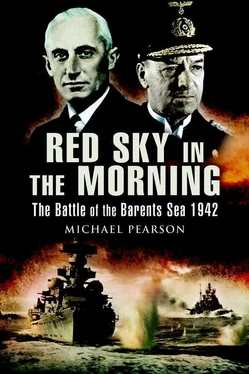My duty tasks at sea involved lookout duties on the Bridge and Air Defence position for 8 hours in every 24, and a further 4 to 6 hours on general maintenance tasks, mostly spent chipping ice from the guns and upper decks when we were well into the Arctic Circle… Long Johns and duffel coats were the extent of our special warm clothing, though for bridge duties we were loaned a sheepskin coat which was passed onto our relief when he turned up to take over duty, as we had insufficient coats to be provided with one each. Balaclavas of course were an absolute essential, and parcels from home and some voluntary organisations provided us with these, together with woollen gloves and scarves. Of course we normally slept in hammocks, but under certain states of readiness for action we were required to sleep at or very near our action station. This, in my case, meant trying to sleep fully clothed on the steel deck of ‘A’ turret [33]where my action station was… It was almost a relief to pass into the Arctic Circle where we were freed from the constant dripping of condensation and of mopping it up, by virtue of the fact that the condensation simply froze, and remained to be chipped off from time to time. [34]
The weather was a powerful opponent, and it was not only the small, lightly built destroyers that were at risk. Paddy Donovan described an occurrence in February 1943 which illustrates the dangers:
We were going up to join a convoy… when the Sheffield went past us. We were in a heavy gale and the destroyers were slowed right down, but the cruiser was able to get past us. Two hours later we caught up and passed her… we could see ‘A’ turret, the whole of the lid was peeled right back… by weight of water. [35]
The incident also created a lasting impression in the mind of Boy 1st Class Albert Twiddy – he was in Sheffield ’s ‘A’ turret at the time.
The voyage to Iceland… encountered violent storms and monstrous seas, so much so that the ship had to heave to in order to ride it out. There was considerable damage around the upper decks. The whalers at the davits were completely destroyed, and some ladders smashed away. It was almost impossible to go on deck and any necessary movement could only be made by hanging on to lifelines rigged throughout the open spaces. It was chaotic below decks, water swilling around the messdecks and flats, and reeking with the vomit that even the hardiest sailors fell victim to. Generally one felt safest when closed up at action stations, and I think that, for most of the time during this appalling weather, was where I was required to be. I was certainly closed up in ‘A’ turret on the forenoon when the heaviest of waves struck.
For any degree of comfort it was a matter of wedging oneself into position and staying there. The noise of the bows crashing into the oncoming seas, the rattle of anchor cables and other objects being moved around was a constant source of deafening noise and discomfort, but I cannot recall being alarmed for my own safety, the ship was so big and well built… but then I had never experienced such extreme conditions before. I could not see the sea, I could only feel its effect on me and the others around me. Solid food or even the thought of it was out of the question and ‘Kye’ [thick cocoa] was the only warming sustenance available if it survived the journey from the galley. I can readily recall that mid-morning, someone had managed to get some and that it was being dispensed into mugs when there was an almighty crash and a sudden flash of light, like lightning, then water cascading down upon us as we saw that one third of the [armoured] turret roof had disappeared and we were exposed to the violent sky and tons of foaming water breaking over the bow forcing its way into what had been just a few moments earlier, our watertight gun turret. Our immediate thoughts were that we had been attacked and struck by the gunfire from an unseen enemy, but apart from being shaken there were few physical injuries… Each successive wave poured more water in, which was swilling its way down into the lower areas of the turret.
Having informed the control tower of our plight, we were shortly ordered to evacuate the turret. It was of course impossible to get out on deck, and there was just one vertical ladder immediately below my telephone position so I was in the prime position to get out first. However, the hood of my duffel coat got caught up on a hook, and I was left virtually hanging over the only escape route. Strong hands soon lifted me clear and I got to the bottom faster than intended. This all seemed to happen so quickly… [but] the personnel in the handling rooms below quickly opened the watertight door leading us out to the lower deck. [We] were confronted by the damage control operator, who on being told that the turret was flooding, immediately closed the door again and put on all the watertight clips, effectively locking us all in. It was only after he had made his report and sought further instructions that we were released from the confines of the turret, but no escape from the water which had flooded a great part of the fore end of the ship. [36]
The daily round of a sailor’s life when not on escort duty consisted of all the routine tasks of a shipboard existence, and as ‘…there were no ENSA comedians or dancing girls in North Russia’, [37]the men had to make their own entertainment. Concert parties would be arranged and acts would volunteer or be shanghaied into doing a ‘turn’. Paddy Donovan remembered that with the ship at Polyarnoe several Russian officers were entertained in the wardroom of Obedient , while down below the men indulged in that forces sing-song known to all as a ‘Sod’s Opera’. Paddy’s suggestion that they go below and join in provoked a horrified response from the Russians – officers mixing socially with the lower ranks, whatever next!?
Convoy escort was a stressful affair with little time to relax, but there were occasional moments of humour. Commander Loftus Peyton-Jones, DSC, DSO, RN, at the time a first lieutenant on board the destroyer Achates , related a story which may be apocryphal but may just as easily be true, concerning Richard Onslow, escort commander for PQ16 in the destroyer Ashanti . The weather being fine, a Luftwaffe long-range reconnaissance seaplane had been circling the convoy just out of range of the escort’s guns for hour after hour, relaying position, course and speed to waiting U-boats. This so irritated Commander Onslow that he is reputed to have signalled to the seaplane, ‘You are making me dizzy – please go round the other way!’ The German pilot must also have had a sense of humour, as he apparently complied with the request! [38]
Progress up the slippery rope of promotion was no less sought after in war than in peacetime, and aboard the 17th Destroyer Flotilla leader HMS Onslow , Acting Leading Stoker Walter Watkin looked forward to confirmation of his rank. However, while the ship waited in Iceland to pick up convoy JW51B , Engineer Lieutenant Kevin Walton notified Watkin that the engineer commander had blocked his promotion for the time being as he had insufficient service time in the Royal Navy, and the appointment had gone to another rating. ‘This did not go down very well with me as I had always been keen to do work on boilers, pumps, evaporator and distilling plant (changing sea water into pure distilled water) etc. However Kevin Walton told me there was no alternative.’ [39]He may have been disappointed at missing his promotion at the time but, as events were to show, it was a disappointment which may have saved his life.
—♦—
For the Germans service in the Arctic was also arduous, but with the considerable advantage that their ships operated from Norwegian ports, making long voyages in those storm-tossed latitudes less likely. Johann Hengel, EK11, U-Hunt & Mine Search Military Insignia, Destroyer-War Insignia, served as radio mate for 1½ years in the port protection flotilla based at Brest, and later as radio station commander in the torpedo boats TA11 and TA24 in the Mediterranean. Between these postings, he served as radio mate and guard commander in the main radio room of the destroyer Z30 at the time of the Barents Sea action. In the summer of 1942 the twenty-one-year old was despatched with his kit bag and gun as his only companions, on the ore train from Germany through Denmark and Sweden to Narvik on the Norwegian coast. He recalled his arrival on board the destroyer, and service in the northern latitudes:
Читать дальше












